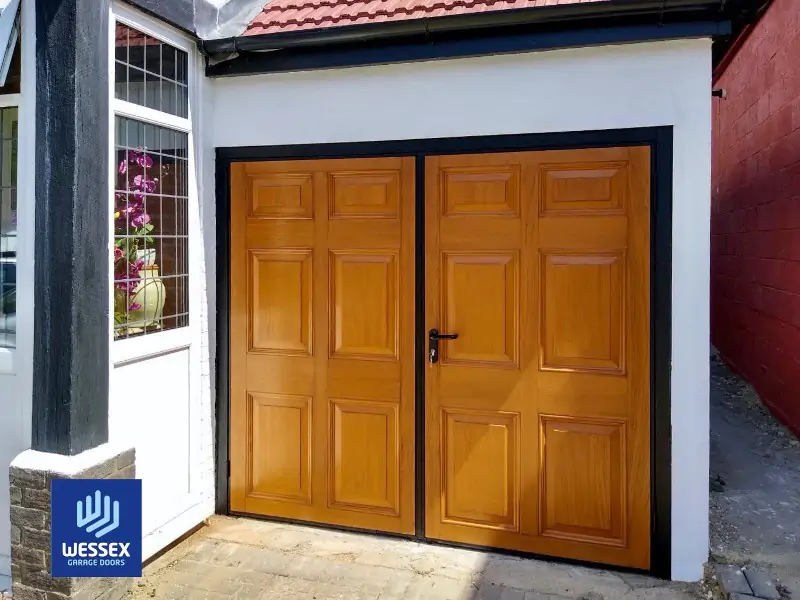
Garage Doors and Parts – Pros and Cons of Hinged Garage Doors are important considerations for homeowners thinking about upgrading or replacing their garage door. Hinged garage doors have been a popular choice for homeowners for many years. Known for their classic look and solid construction, these doors provide reliable performance. Hinged doors work by swinging outward, much like a traditional door, and they offer a variety of benefits. However, like all garage doors, hinged models come with their own set of challenges. Whether you’re considering installing a new garage door or replacing an old one, it’s important to understand both the advantages and the potential downsides of hinged garage doors.
Hinged garage doors are typically constructed from durable materials like steel, wood, or aluminum. These materials ensure the doors remain intact and functional for many years. Because there are fewer moving parts compared to other types of garage doors, such as sectional doors, hinged models are less likely to experience mechanical issues. Their robust design allows them to withstand daily use without significant wear and tear, making them a great long-term investment.
“Read about: Choosing the Right Door Panels: Insulated vs. Non-Insulated”
A key reason homeowners choose hinged garage doors is their timeless aesthetic. With their traditional design, they offer a charming look that can complement a wide range of home styles. Whether your house has a rustic, colonial, or contemporary design, hinged doors can be customized to match your home’s exterior. Additionally, these doors can be painted in various colors and finished with different textures, allowing for even more customization.
Hinged garage doors are incredibly simple to operate. Unlike automatic doors that require electrical systems and remotes, hinged doors open manually, with minimal effort. This straightforward mechanism can be ideal for homeowners who don’t mind getting out of their vehicle to open the door. Furthermore, manual operation means there’s less risk of malfunctions related to motors and sensors, making it a reliable choice for many.
Compared to automatic or sectional garage doors, hinged models are generally more affordable. They have fewer moving parts and do not require complex electrical systems, which reduces both installation and maintenance costs. Homeowners who are working with a limited budget will appreciate the affordability of hinged garage doors, as they provide excellent value for money.
Hinged garage doors require minimal maintenance due to their simple construction. With fewer mechanical parts and no motors, there’s less that can go wrong. Occasional lubrication of the hinges and checking the door’s frame are usually all that’s needed to keep it in good working order. This is a major advantage for homeowners who prefer a low-maintenance option without frequent repairs or inspections.
“Read more: Key Differences: Flat Tracker vs. Street Tracker”
One of the biggest drawbacks of hinged garage doors is the space they require. Since these doors swing outward to open, they need plenty of room in front of the garage. In homes with narrow driveways or limited space, this can pose a challenge. Additionally, if you park a vehicle close to the door, it may be difficult to open it fully. This makes hinged doors less practical for homes in crowded areas or places with tight parking spaces.
Unlike other types of garage doors, hinged doors tend to offer less insulation. The gaps between the door panels can lead to heat loss or cold drafts in the garage. This can be particularly problematic if you use your garage as a workspace or if it’s attached to your home. A lack of insulation can also affect energy efficiency, as cold or hot air from the garage can influence the overall temperature inside your house.
Hinged garage doors are more vulnerable to damage from extreme weather conditions. Strong winds, hail, and heavy rain can potentially cause harm to the door, especially if it is not properly reinforced. For example, during storms, the door may be more likely to bend or get damaged due to its outward-swinging motion. If you live in an area prone to severe weather, a more resilient garage door might be a better option.
While manual operation can be seen as a benefit in some cases, it also has its drawbacks. If you’re caught in a rainstorm or snowstorm, having to get out of your car to open the door can be inconvenient. Additionally, in emergency situations where quick access is needed, manually opening the door may not be the fastest solution. Although automatic openers can be installed, many homeowners choose to keep the manual operation, adding to the inconvenience during adverse weather conditions.
While the Pros and Cons of Hinged Garage Doors are important to consider, security is one area where these doors may fall short. While hinged doors are generally secure, they may not be as resistant to break-ins as other types of garage doors. The outward swing can make it easier for intruders to pry open the door if they have access to the hinges. Additionally, since the door is manually operated, there’s a risk of leaving it open accidentally, providing an opportunity for unauthorized access.
This website uses cookies.